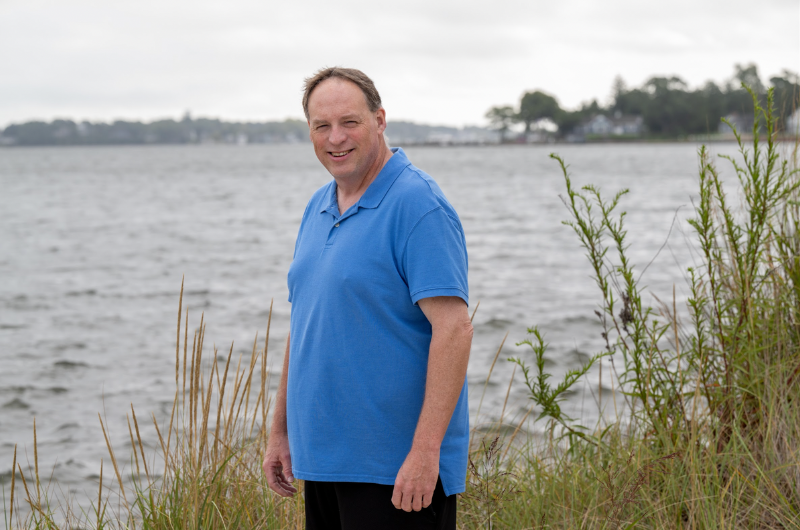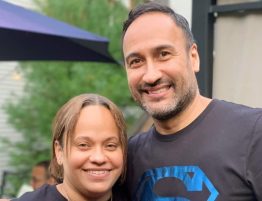
Joe Keenan likes to go to Atlantic City to celebrate his birthday every year. When he turned 54 in August 2023, he was there with his family, but something that wasn’t typical of his birthday celebration was happening: he was exhausted, and he got so winded he could hardly walk. “I knew I was out of shape,” Joe says, “but walking was never a problem.”
When both of his legs swelled, Joe and his family cut his birthday trip short, raced home and went directly to Ocean University Medical Center. The emergency department team ran a number of tests and sent him to Ocean’s Heart Center, where he was diagnosed with congestive heart failure.
“I was shocked hearing that diagnosis because I thought if it was something involving the heart, there would be some chest pains or something,” Joe says.
Congestive heart failure happens when the heart isn’t pumping enough blood to meet the needs of the body. Unlike a heart attack, congestive heart failure doesn’t necessarily bring on chest pains. Shortness of breath, fatigue and leg swelling are among congestive heart failure’s most common symptoms. Other common symptoms include persistent coughing, nausea and weight changes.
Joe’s congestive heart failure wasn’t caused by blockages, but most likely the effects of having several other health conditions, including diabetes and high blood pressure, says Joe’s interventional cardiologist, Muhammad R. Raza, M.D.
Dr. Raza prescribed a number of medications for Joe and sent him home wearing a LifeVest, an external defibrillator that he had to wear all the time except when showering. Dr. Raza also sent Joe to Ocean’s cardiac rehabilitation program for three months.
“When I told friends and family I was going to cardiac rehabilitation, some said it was going to be a waste of time,” Joe says, but it turned out it was anything but. “I was exhausted the first couple of days, but as we went on, I felt better and better. It was awesome.”
Cardiac rehabilitation at Ocean is a guided exercise program during which participants gradually build their strength while being supported by the medical team. “It’s an individualized treatment planfor each patient based on where they are and what their goals are,” says Jessica Capper, R.N., a cardiac rehabilitation nurse at Ocean.
In addition to building physical strength through exercise, participants also get dietary and medication education and emotional support. “A lot of patients are nervous when they start because they don’t know what they can do, so it’s building that confidence for them to know their limitations,” says Jessica.
Because Joe had his vital signs taken at each session and was monitored with an EKG while he exercised, his cardiac rehabilitation had the additional benefit of helping Dr. Raza guide Joe’s treatment. After each of Joe’s sessions, Dr. Raza would get a comprehensive report from the rehabilitation team. When Dr. Raza saw that Joe’s blood pressure was low and he was having some extra heartbeats, he was able to adjust Joe’s medications immediately.
“With cardiac rehabilitation, you can catch someone whose heart isn’t pumping enough blood, and we can quickly adjust accordingly,” he says. Being able to do that means keeping people healthier and out of the hospital. “The risk of dying goes down, and so does the risk of getting admitted to the hospital again.”
Thanks to cardiac rehabilitation, Joe met his goals of no longer needing the LifeVest and being able to return to his job as a letter carrier. His heart function improved so much that he went from Stage 4 congestive heart failure to Stage 1.
“I feel the rehabilitation definitely paid off,” Joe says. “I do a lot of lifting and walking at work, and Itake walks every day, and I still feel great.”
Next Steps & Resources
- Meet our source: Muhammad R. Raza, M.D.
- To make an appointment with Dr Raza or a member of his team, call 732-458-7575.
Credit:
Published in Health U, a magazine sponsored by Hackensack Meridian Health.





